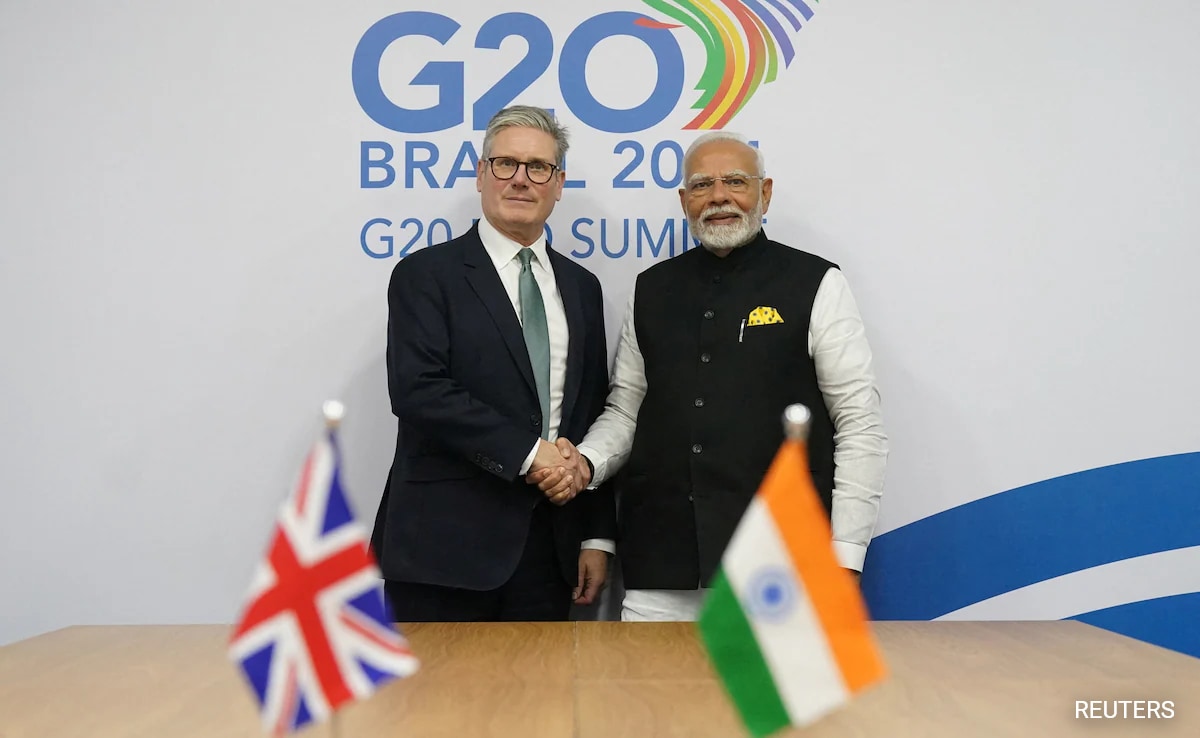Prime Minister Narendra Modi has arrived in the UK for a two-day visit, which is expected to culminate in the signing of the historic India-UK Free Trade Agreement (FTA). This visit, taking place on July 23-24, marks the beginning of Modi's two-nation tour, which will also include a trip to the Maldives. The FTA, which has been under negotiation for three years, is projected to significantly boost bilateral trade and strengthen the Comprehensive Strategic Partnership between the two nations.
Here are some key highlights of the visit and the expected outcomes:
- Free Trade Agreement (FTA): The centerpiece of PM Modi's visit is the signing of the FTA, which aims to eliminate tariffs on 99% of Indian exports to the UK and reduce tariffs on 90% of British goods. Commerce and Industry Minister Piyush Goyal will accompany PM Modi and sign the agreement with his British counterpart, Business and Trade Secretary Jonathan Reynolds.
- Boost to Bilateral Trade: The FTA is expected to double bilateral trade between India and the UK by 2030, increasing it from the current $60 billion to $120 billion. This will be achieved by removing trade barriers and granting greater market access to both countries.
- Key Benefits for Indian Exporters: The agreement is expected to greatly benefit Indian exporters, particularly in sectors such as textiles, footwear, marine products, and engineering goods. Ajay Sahai, Director General of the Federation of Indian Export Organisations, noted that the UK is a crucial market for Indian exporters, and the FTA will provide enhanced access for these sectors.
- Reduced Tariffs on British Goods: As part of the FTA, India will reduce tariffs on British whisky, cars, and certain food items. This move is expected to boost British exports to India and strengthen the economic partnership between the two countries.
- Discussions on Key Issues: In addition to the FTA, PM Modi will hold wide-ranging discussions with UK Prime Minister Keir Starmer on various bilateral relations, including trade, investment, technology, climate, defence, and migration. They will also discuss regional and global issues of mutual interest.
- Meeting with King Charles III: PM Modi is scheduled to meet with King Charles III during his visit. This meeting underscores the strong ties between India and the UK and provides an opportunity to discuss matters of mutual interest.
- Concerns about Khalistani Extremism: PM Modi is expected to raise concerns about the presence and activities of Khalistani extremists in the UK. India has been seeking cooperation from the UK in addressing this issue and preventing extremist elements from undermining bilateral relations.
- Review of Cooperation: India and the UK will review their cooperation in various fields, including defence, climate, innovation, education, and technology. This includes collaboration in emerging areas such as artificial intelligence and semiconductors.
- Next Steps for the FTA: After the formal signing, the FTA will need to be approved by the British Parliament and India's federal cabinet. It is expected to take effect within a year.
- Maldives Visit: Following his engagements in the UK, PM Modi will travel to the Maldives from July 25-26. He will attend the country's 60th Independence Day celebrations and meet with President Mohamed Muizzu.
PM Modi's visit to the UK is a significant step towards strengthening the strategic partnership between India and the UK. The FTA is expected to unlock new opportunities for trade and investment, benefiting businesses and citizens in both countries. The discussions on various issues, including security and technology, will further deepen cooperation and address shared challenges.

